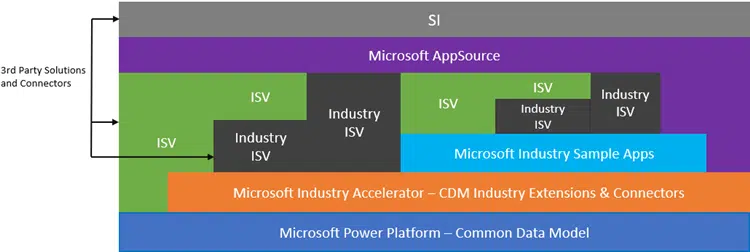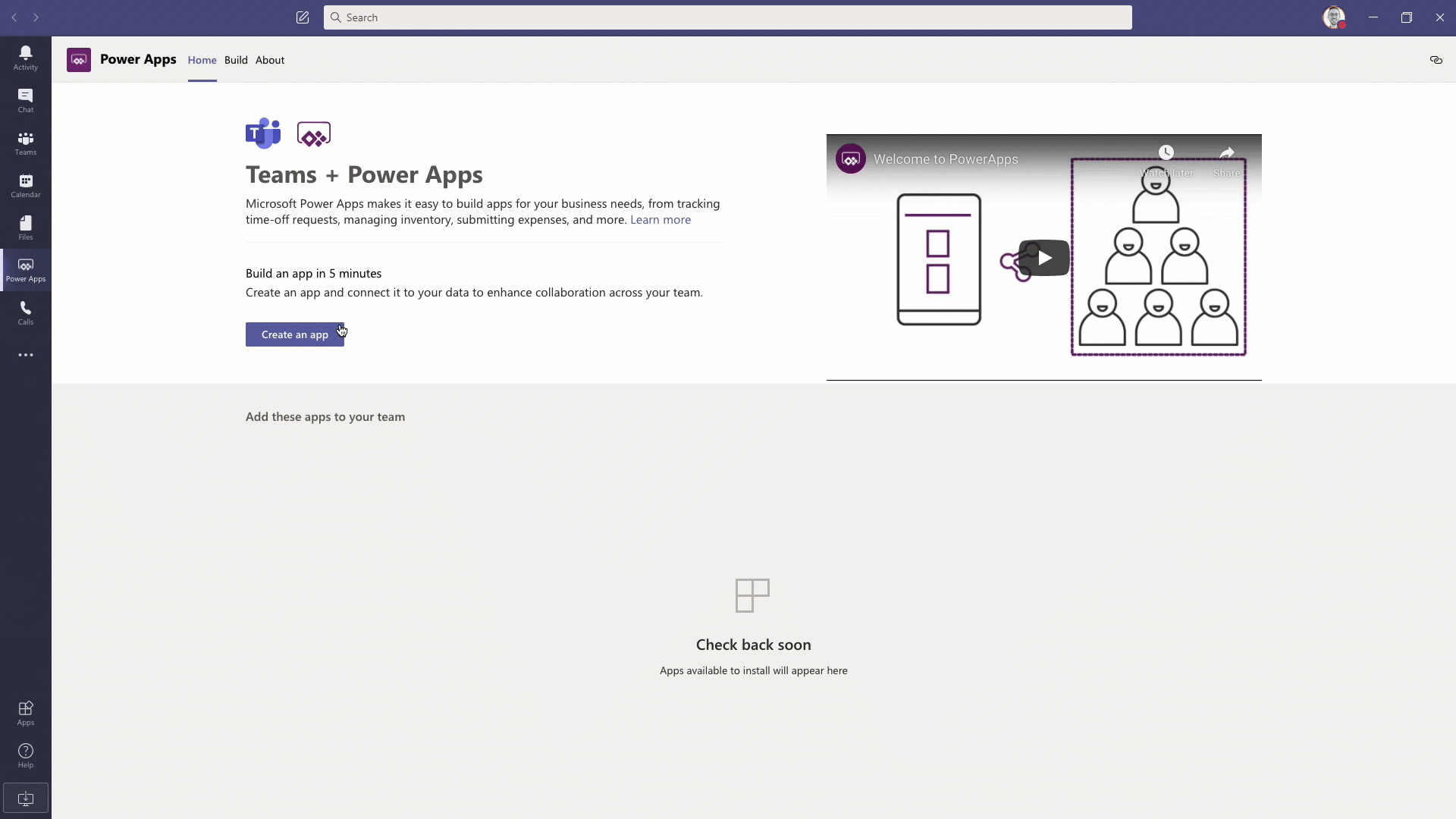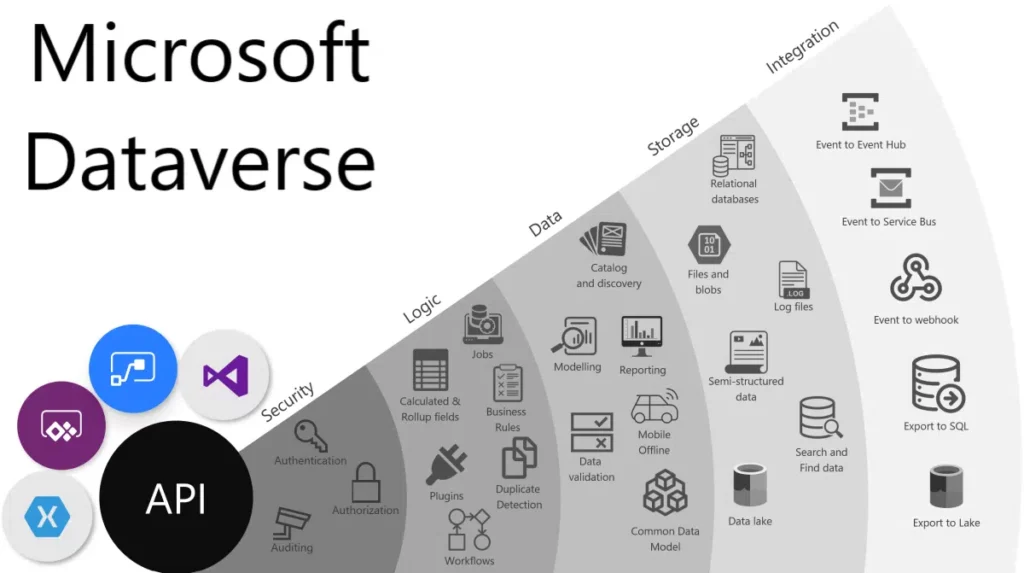Microsoft Dataverse
What Is Dataverse?
Microsoft Dataverse is a data storage and management engine serving as a foundation for Microsoft’s Power Platform, Office 365 and Dynamics 365 apps. It decouples the data from the application, allowing an administrator to analyze from every possible angle and report on data previously existing in different locations.
Dataverse is based on Common Data Model principles, enhanced with rich security features, business logic, and productivity tools. Data of any size and format could be easily imported, managed and exported out of Dataverse with streamlined processes. Dataverse is also built on Microsoft Azure to ensure scalability, global compliance, data security and availability.
Introducing Microsoft Dataverse
Microsoft Dataverse is a functional implementation of the Common Data Model that serves as the foundation for Microsoft’s Power Platform, Office 365, and Dynamics 365 applications. It includes a comprehensive set of pre-defined entities (or "tables") representing common business objects like Accounts, Contacts, Services, and Invoices. These metadata definitions come with built-in relationships and business rules, enabling seamless integration across applications without customization.
Powerful Integrations and Security
Data from external sources can be imported into Dataverse using tools like Azure Data Factory, dataflows, and Power Queries. The platform supports connectivity with a wide range of systems, including SAP ERP, Salesforce, Amazon Redshift, SharePoint, Oracle, and more—ensuring flexibility for diverse data ecosystems.
Built on Microsoft Azure, Dataverse delivers scalability, compliance, and high availability. Security is managed through customizable, role-based access controls, providing robust data protection while maintaining versatility for global deployments.
Dataverse, Fabric & Power Platform: Low-Code, High Impact
Microsoft Dataverse serves as the central data platform for Power Apps and Dynamics 365, and its integration with Microsoft Fabric unlocks powerful analytics capabilities.
By connecting directly to Fabric’s OneLake, Dataverse eliminates data silos and provides real-time access to business data without replication or ETL processes. This ensures reports and dashboards always reflect current operations across finance, sales, and customer service.
Together, Dataverse and Fabric create a complete analytics-to-action solution. Fabric’s AI and machine learning tools uncover hidden patterns in your Dataverse data, while Power Platform turns these insights into automated workflows and custom apps—all without complex coding. From predicting inventory needs to personalizing customer engagements, this integration transforms raw data into measurable business improvements.

Benefits of Microsoft Dataverse
Easy to manage
Both the metadata and data are stored in the cloud. You in turn don’t need to consider the details of how they’re stored, as this is handled directly by the cloud service.
Easy to secure
Role-based security allows you to control access to tables for different users within your organization. Data is securely stored so that users can see it only if you grant them access. Additionally, Microsoft’s Dataverse provides the ability to create field-based security so that you can choose the granularity of security in your organization.
Logic and validation
Define calculated columns, business rules, workflows, and business process flows to ensure data quality and drive business processes seamlessly and with limited user engagement.
Productivity tools
Tables are available within the add-ins for Microsoft Excel to increase productivity and ensure data accessibility, from anywhere and on any device.
Natively integrated into Dynamics 365 and Power Platform
Data from your Dynamics 365 and Power Platform applications is also stored within Dataverse, allowing you to quickly build apps that use and recycle your Dynamics 365 data and extend your apps with Power Apps.
Seamless Data Integration with Azure
Simplifly Data Exchange & Processing
The integration between Microsoft Dataverse and Azure makes data exchange and processing straightforward. Developers can use Dataverse to send runtime message data to Azure solutions in the cloud, which is essential for sharing context with external business applications.
Azure Service Bus & Functions
Azure Service Bus ensures secure and reliable communication between Dataverse and these external apps, keeping business data changes in sync. Azure Functions can also handle data and events from Dataverse, allowing for custom processing and automation.
This setup supports various needs, from real-time data processing to complex workflows, making business applications more functional and flexible.

Dataverse handles data in any shape and form
As a result, a wide range of enterprise integration scenarios — from retrieving data sent in a spreadsheet as an email attachment, to emerging scenarios, like using Dataverse data in a blockchain network — can be achieved with ease and with little to no code required.
Integration efforts that previously were measured in days and weeks can now often be measured in hours and minutes. This not only preserves your in-house development efforts, but also saves you from acquiring future technical debt.
In addition to providing the ability to create data or import it from other systems, Dataverse also supports virtual tables or “entities”. Virtual tables map data in an external data source so that it appears to exist in Dataverse. This enables Dataverse to execute real-time data operations against the external data source and surface a “read-only” column of that data in your user interface.
How Dataverse Works
Handles data in any shape and form
Dataverse works with all data types — relational, non-relational, file, image, search, and data lakes — using visual designers to create tables, relationships, and workflows without coding. Its deep integrations with Azure, Dynamics 365, and Microsoft 365 simplify setup, while connectors link to devices, apps, and SaaS platforms. Complex tasks like processing spreadsheet attachments or blockchain data now take minutes instead of weeks, reducing technical debt. Virtual tables (entities) enable real-time, read-only access to external data sources directly within Dataverse, giving businesses flexible, efficient data management.
Works with any software
Dataverse accelerates app development with Power Apps, using the Common Data Model to build secure, scalable solutions for web, mobile, and Microsoft Teams. It supports offline-capable mobile apps (iOS/Android) and offers a REST API, SDK, and plugins for custom development. Power Virtual Agents lets you create AI-powered bots for employee/customer interactions, while native integrations with Excel, Outlook, Power BI, and Azure Data Factory streamline workflows. Whether you're a developer or business user, Dataverse connects seamlessly with the tools you rely on.
Unlocks gems hidden in the data
Dataverse transforms data into insights with built-in charts, paginated reports, and Power BI dashboards. AI Builder’s prebuilt models bring AI to Power Apps and Power Automate — no expertise needed — while custom models can be trained in minutes. For advanced analytics, its managed data lake supports machine learning, Power BI, and Azure Synapse Analytics, combining data warehousing, Apache Spark, and SQL engines. From basic reporting to AI-driven analysis, Dataverse turns raw data into actionable intelligence.
Offers multi-level security
Dataverse safeguards data with Azure AD authentication, encryption, and role-based security, assigning privileges to users, teams, or business units. Column-level security adds granular control over field access, while hierarchy rules restrict data visibility: managers access same/parent unit data, and position hierarchies enable cross-unit access. With these layered protections, Dataverse ensures compliance without sacrificing flexibility for organizational needs.
Protects you against malicious behavior
Licensing governs daily request limits (entitlement limits), while service protection policies prevent traffic surges from disrupting performance. Caps on concurrent connections, API requests, and execution time (evaluated every 5 minutes) ensure platform stability. If limits are exceeded, exceptions are triggered—protecting service health for all users without compromising functionality.
Takes care of your data
Automatic (Azure SQL-backed) and manual backups protect data integrity, with retention varying by environment: production instances with Dynamics 365 retain backups for 28 days, while others (and sandboxes) keep them for 7 days. Manual backups (unlimited and storage-exempt) are ideal before updates or customizations. With reliable backup policies, Dataverse ensures your data is always secure and recoverable.
Industry Solutions Accelerators for Dataverse
Microsoft's industry accelerators provide pre-built, connected experiences tailored for automotive, healthcare, nonprofit, education, manufacturing, media, and banking sectors (with more added regularly). These solutions simplify implementation by offering a unified data layer - eliminating the need to build custom integrations or merge disparate systems.
Developed through an open community managed by Microsoft, each accelerator incorporates industry best practices to deliver actionable insights and personalized customer engagements faster, while reducing development costs and time-to-value.
Automotive Industry Accelerator
Includes entities for deals, sales contracts, specifications, fleet, warranties, inspections, test drives, branding, customer-vehicle relationships, vehicle and equipment, leads, service and after-sales management, and more.
Banking & Finance INdustry Accelerator
Built in agreement with open source specifications from the Banking Industry Architecture Network (BIAN) to include definitions for loans, mortgages, referrals, branch details, collateral, deal, limit, facilities, etc.
Education Accelerator
Provides easy access to data entities such as students, faculty, extracurricular activities, previous education, test scores, courses, academic periods, programs, test types, registration status, and areas of interest.
Nonprofit Accelerator
Includes extensions to the Common Data Model to develop solutions for managing constituents, raising funds, grants and awards, program delivery, and tracking impact.
Media & Communications Accelerator
Provides extensions for event and venue management, sports management, ticketing and advertising sales, media sponsorships, and various guest interactions such as event registrations and the tracking of loyalty programs.
Manufacturing & Supply Chain Accelerator
Packed with scenarios to qualify new suppliers, onboard suppliers for API data integration, and manage the ongoing supplier relationship.
Healthcare Accelerator
Unifies electronic health record (EHR) data while enabling a suite of systems and applications to help more easily manage and understand patient outcomes.
ISV x Dataverse Opportunities
Dataverse, built around a Common Data Model, offers exciting opportunities for independent software vendors (ISVs) to innovate and expand their solutions. ISVs can build their own accelerators on top of the Common Data Model (CDM) or extend existing accelerators to add more functionality. Additionally, they can further extend Microsoft or third-party apps to create comprehensive solutions, enhancing those built on top of apps available from AppSource.
ISVs can also provide expertise for customer and industry solutions built on Microsoft Industry Accelerators. This enables software integrators to create industry-specific solutions that support customer needs, build their own tools, or support ISV deliveries. These opportunities allow ISVs to develop industry vertical solutions, support practices, and directly assist customers in building tailored solutions.

Dataverse for Microsoft Teams
Combinine Low-Code Power Apps With Teams
Microsoft now offers a free version of Dataverse within its Teams app. This lighter version is separate from the Dataverse in Dynamics 365 or Power Apps and is limited to a relational database only. It cannot exceed 2 GB or one million records. A paid upgrade is available for businesses needing more capacity.
Dataverse for Teams aims to empower non-IT users to automate tasks easily. Users can create no-code/low-code apps with the Power Platform canvas interface, share them with the team, and use Dataverse for data storage. Pre-built templates help users get started quickly, enabling small-scale automation and business intelligence without needing a Dynamics 365 or Power Platform license.

Request a Consultation or Demo
Contact us below with any questions about Dataverse or to discover how Dataverse, Power Platform, and Microsoft Fabric can unlock deep insights and drive real-time operational intelligence for your business.
